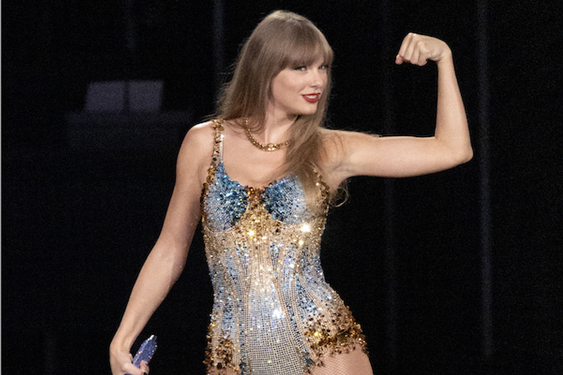When Colin Meloy and his bandmates in the Decemberists took a break in 2011, the agenda was open-ended. The band’s steady growth had paid off in a new commercial peak — the Portland quintet’s “The King is Dead” had debuted at No. 1 on the Billboard album chart. But Meloy, guitarist Chris Funk, keyboardist Jenny Conlee, bassist Nate Query and drummer John Moen wanted off the record-release-tour cycle they had been on for a decade.
Meloy poured his energies into his family and a long-simmering childrens book trilogy with his wife, Carson Ellis. It wasn’t a given that when the band got back together for a few days in May 2013 that there would be a new Decemberists album at the end of the road. But “What a Terrible World, What a Beautiful World” (Capitol) finally arrived a few months ago, the result of an episodic series of recording sessions that found the band approaching its music from fresh angles and reigniting enthusiasm for playing together again.
In an interview, Meloy elaborated with typical candor on how he and his bandmates overcame burnout and came up with an album filled with some of his most personal songs ever. Here are a few excerpts from that conversation:
On his view of the Decemberists’ future after the 2011 hiatus
“I was ready for any eventuality. Naturally coming off a lot of time working on the band, 10 years, including the last six years with basically no time off, I’d be lying if I didn’t think at some point I would never come back to this. Touring with ‘The King is Dead,’ I was going in thinking this could be it, forever, maybe. But during the tour, Jenny had this health scare with breast cancer (from which she has recovered), and we did a lot of shows without her. I just wanted to get back on the road with Jenny, to have her back on stage with us. That convinced me that I did want to come back. You toy with these things in your mind, fantasize about stepping away. Coming face to face with reality like that, it brings your own life into focus. I realized how much I loved the band and the people in it.”
On putting his band on hold
“Being the writer for the group, I know a lot hinges on me. I often wish I could be a more tireless leader for the group, but that’s a lot of pressure for me to take on. There’s an equation. I am considering the livelihoods of my bandmates, to live without undue financial pressures, but at the end of the day, my job is to follow where my mind is taking me.”
On the first recording session after the hiatus
“It wasn’t that scary to me. I’ve talked to (Death Cab for Cutie’s) Ben Gibbard about this before. Early on in your career, there is this constant concern about whether you’re going to be able to keep doing this. With each song you think, ‘Is this going to be the last one?’ But then you do enough work, and you realize you can do this. It’s something I know how to do and can count on. Only a handful of songs were kicking around when we went into the break, but I knew the songs would come and they did. I don’t think I will ever not write songs. Even in college getting my degree to be an English teacher, I was still writing songs. It’s like this compulsive thing I have.”
On recording the album in short bursts over 18 months
“It was definitely a novel way for us to work. I booked a handful of days at first. I don’t know we’d done that since our first demo, when that was all you could afford. Nobody heard the songs ahead of time. We just showed up, hung out, went into the main room and I played them three, four songs. Everyone would grab whatever instruments they had at home and that dictated what they played. There was a free spirit to it — I don’t remember working in that off-the-cuff fashion before.”
On not recording a concept album
“I wanted the concept to be no concept. We had these concept releases for years. Even ‘The King is Dead’ had a unifying aesthetic, recording in a barn with no overdubs. This one, the songs dictated. As we got further along, we realized there was a big pop motif that we began to run with, which made each song its own thing.”
On the relationship between the latest album’s first song, “The Singer Addresses His Audience,” and the early Decemberists song “I Was Meant for the Stage”
“In the older one, I was an aging thespian addressing the crowd, which in his mind was massive, fawning. It always worked best when we played it in teeny clubs. ‘The Singer Addresses his Audience’ is almost the opposite. It’s the singer of a boy band saying, ‘This is where I belong, good or ill, this is where I’ll always be.’ It’s all about agency: Who do you belong to? The guy in the older song is shackled to his career as much as the guy in the boy band, but the boy-band singer is kicking against it. He’s telling his audience, ‘You don’t own me.’”
On fans who do claim ownership over a band
“When I wrote ‘The Singer Addresses His Audience,’ I’m poking fun at my own mindset. I was that fan. And I still am to a degree someone who will write off a once-favored band after a cursory listen to a new record. Just discard it. There are so many beloved bands that I’ve done that to. ‘No, I’m done with them,’ even though that band changed my life once. You’re unwilling to go past a certain record. I can only imagine people have the same experience as me with our band.”
On the dark humor that coarses through “What a Terrible World ...”
“Most of our work is fairly sardonic, but it’s not always obvious. I think of (the 2009 album) ‘The Hazards of Love’ as a hilarious romp, but there are people who take it very, very seriously — and why shouldn’t they? That’s the way it’s presented. Humor or irony in songwriting is something I love, and I hope that exists in my songs. Morrissey is the king of the ironic songwriters, also Leonard Cohen, who I listened to a lot in making this record. He gets seen as this serious, gravel-voiced poet, but his songs can be really juvenile the way they balance the sacred and profane. Some of his stuff is just super dirty. (Cohen’s 1977 album) ‘Death of a Ladies’ Man’ is pretty puerile, juvenile stuff from the poet laureate, and I love it.”
On writing “12/17/12” on the new album in response to the Sandy Hook Elementary School shootings
“It was three days after the actual event, and I was reeling from that like a lot of other people. My son Hank was in first grade at the time, and you see a mirror of these kids who were killed in your own life. I was just blown back. Despair, anger, hopelessness — it wasn’t until that very moving moment, where Obama was reading the names of the victims (in his national speech) that I reacted and wrote the song. The prior three days, the most comforting words were the sense that if you feel hopeless, bring your loved ones close to you, be thankful for that. I watched the speech, and went over to the guitar, and there was this churning thing inside, I needed to do something. And this song got written. There is no real mention of the event itself, I didn’t want it to be a topical song. But I wanted to bring out that idea about taking stock in a time of tragedy and being grateful for what we do have. I usually write and rewrite, but that song didn’t take any tweaking. Maybe it should have. But that song needed to be vomited. It’s sung as it is in my notebook. There are things about it I might change in retrospect, but something needed to be preserved in that moment.”
———
©2015 Chicago Tribune
Visit the Chicago Tribune at chicagotribune.com
Distributed by Tribune Content Agency, LLC




